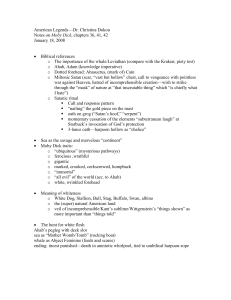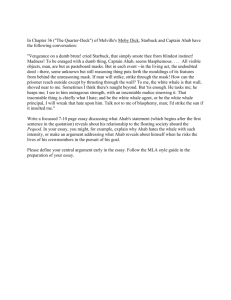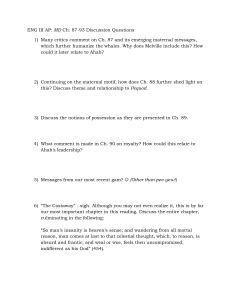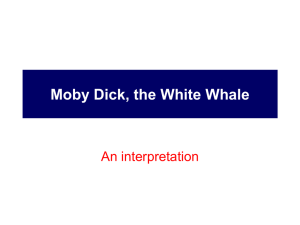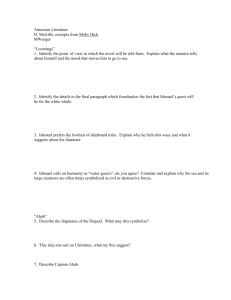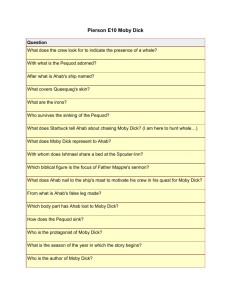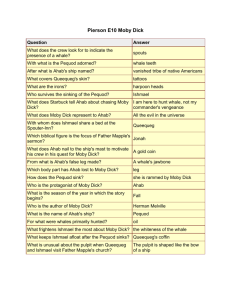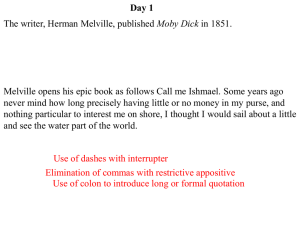Prudence, Passion and Persuasion in Moby Dick
advertisement
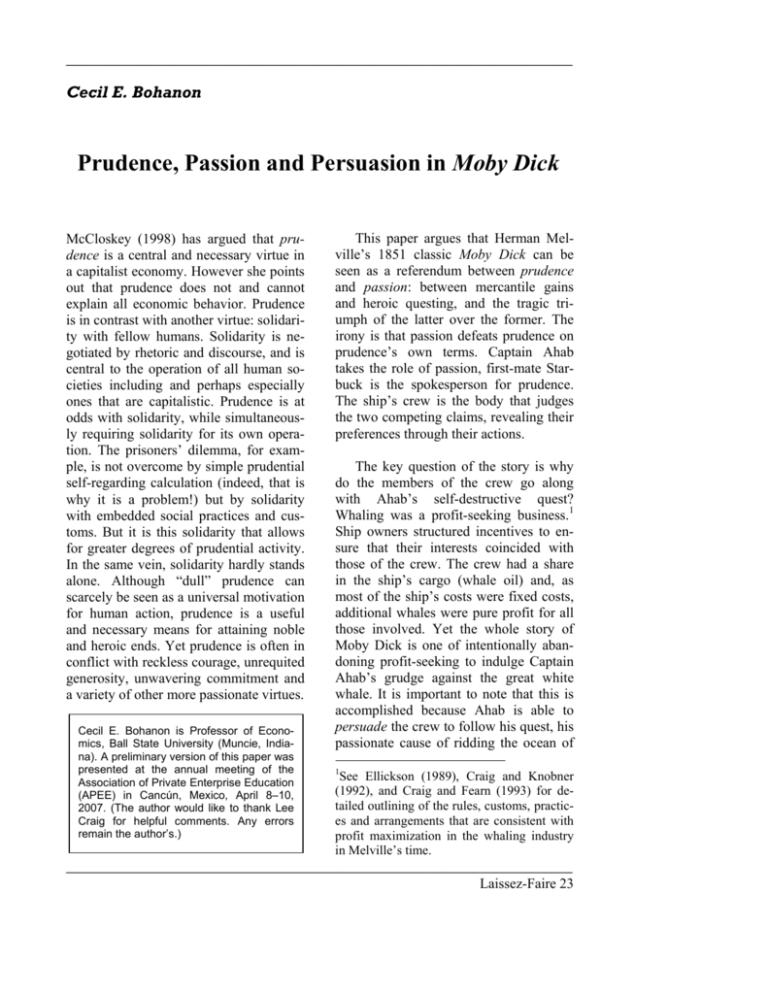
__________________________________________________________________ Cecil E. Bohanon Prudence, Passion and Persuasion in Moby Dick McCloskey (1998) has argued that prudence is a central and necessary virtue in a capitalist economy. However she points out that prudence does not and cannot explain all economic behavior. Prudence is in contrast with another virtue: solidarity with fellow humans. Solidarity is negotiated by rhetoric and discourse, and is central to the operation of all human societies including and perhaps especially ones that are capitalistic. Prudence is at odds with solidarity, while simultaneously requiring solidarity for its own operation. The prisoners’ dilemma, for example, is not overcome by simple prudential self-regarding calculation (indeed, that is why it is a problem!) but by solidarity with embedded social practices and customs. But it is this solidarity that allows for greater degrees of prudential activity. In the same vein, solidarity hardly stands alone. Although “dull” prudence can scarcely be seen as a universal motivation for human action, prudence is a useful and necessary means for attaining noble and heroic ends. Yet prudence is often in conflict with reckless courage, unrequited generosity, unwavering commitment and a variety of other more passionate virtues. Cecil E. Bohanon is Professor of Economics, Ball State University (Muncie, Indiana). A preliminary version of this paper was presented at the annual meeting of the Association of Private Enterprise Education (APEE) in Cancún, Mexico, April 8–10, 2007. (The author would like to thank Lee Craig for helpful comments. Any errors remain the author’s.) This paper argues that Herman Melville’s 1851 classic Moby Dick can be seen as a referendum between prudence and passion: between mercantile gains and heroic questing, and the tragic triumph of the latter over the former. The irony is that passion defeats prudence on prudence’s own terms. Captain Ahab takes the role of passion, first-mate Starbuck is the spokesperson for prudence. The ship’s crew is the body that judges the two competing claims, revealing their preferences through their actions. The key question of the story is why do the members of the crew go along with Ahab’s self-destructive quest? Whaling was a profit-seeking business.1 Ship owners structured incentives to ensure that their interests coincided with those of the crew. The crew had a share in the ship’s cargo (whale oil) and, as most of the ship’s costs were fixed costs, additional whales were pure profit for all those involved. Yet the whole story of Moby Dick is one of intentionally abandoning profit-seeking to indulge Captain Ahab’s grudge against the great white whale. It is important to note that this is accomplished because Ahab is able to persuade the crew to follow his quest, his passionate cause of ridding the ocean of 1 See Ellickson (1989), Craig and Knobner (1992), and Craig and Fearn (1993) for detailed outlining of the rules, customs, practices and arrangements that are consistent with profit maximization in the whaling industry in Melville’s time. __________________________________________________________________ Laissez-Faire 23 __________________________________________________________________ the monster Moby Dick to the exclusion of profit and ultimately at the cost of the crew’s lives. The plan of this paper is a bit unconventional. I will follow the basic outline of Melville’s story illustrating my thesis using direct quotes from Melville’s text. I will also offer a number of other insights. All the quoted material is referenced by chapter. Longer passages are in italics. The Whaling Ship: Ishmael and Queequeg sign on for the Pequod The protagonist in Melville’s Moby Dick is a late twenty-something adventurerwriter named Ishmael, who makes an accidental acquaintance and ultimately a close friendship with the South Sea Islander Queequeg in New Bedford, Massachusetts. The two agree to sign onto a whaling ship. In Chapter 16, Ishmael describes signing on to the whaling ship Pequod. The chapter reveals a number of details about the financing of whaling operations. A whaling voyage typically lasted for up to three years. The supplies necessary to support the crew were provided by the ship’s owners, who in this story are two retired Quaker whalers named Captain Bildad and Captain Peleg. These two are the “largest owners of the vessel,” although other shares were held by “a crowd of old annuitants, widows, fatherless children, and charity wards.” Ishmael reveals the structure of incentives for the crew: “I was already aware that in the whaling business they paid no wages, but all hands, including the captain received certain shares of the profits called lays.” Ishmael goes on to explain that the lays reflected an ex-ante estimate of the sailors marginal product: “… these lays were proportionate to the degree of importance pertaining to the respective duties of the ship’s company.” Expecting a 1/275th lay, and hoping for a 1/200th, Ishmael is offered a 1/777th lay by the more penurious owner, Bildad. Peleg objects (“thou dost not want to swindle this young Man”), and eventually the three, Bildad, Peleg and Ishmael, agree on a 1/300th lay.2 Ishmael’s companion Queequeg was an experienced whale harpooner. His lay negotiation, described in Chapter 20, is a classic illustration of how the desire for prudential gain trumps passion-based provincial prejudices. When Queequeg, a South Sea Islanders, attempts to sign on for the Pequod Captain Peleg asserts: “no cannibals on board (unless) ... (thou) art at present in communion with a Christian church.” Ishmael insists that Queequeg is a member of the “First Congregation of the whole Worshiping World ....” This flippant reply assuages Peleg, who goes on to question Queequeg: “Did you ever strike a fish?” The text then describes: Without saying a word, Queequeg, in his wild sort of way, jumped upon the bulwarks, from thence into the bows of one of the whale boats hanging on the side; and then bracing his left knee, and posing his harpoon, cried out in some such way as this ‘Cap’ain, you see him small drop tar on water dere? You see him? Well, spose him one whale eye, well, den!’ and taking sharp aim at it, he darted the iron right over old Bildad’s broad-brim, clean across the ship’s deck and struck the glistening tar-spot out of sight. ‘Now’ said 2 Perhaps Bildad and Peleg were engaging in a “good cop, bad cop” strategy. Bildad gave an absurdly low lay, allowing Peleg’s lay to seem generous, although less than what Ishmael anticipated. __________________________________________________________________ Laissez-Faire 24 __________________________________________________________________ Queequeg, quietly hauling in the line, ‘spos-ee him whale-e eye, why, dad whale dead.’ ‘Quick, Bildad’ said Peleg ‘… get the ship’s papers. We must have Hedgehog there … we’ll give ye the ninetieth lay, and that’s more than ever was given a harpooner yet out of Nantucket. During Ishmael’s negotiations in Chapter 16 he inquired as to the ship’s captain. The owner Peleg reveals that Ahab is “a queer man,” but that I know Ahab well; I’ve sailed with him as mate years ago; and know what he is—a good man— … I know too that ever since he lost his leg last voyage by that accursed whale, he’s been a kind of moody … it is better to sail with a moody good captain than a laughing bad one. Although aware of Ahab’s misfortune, the ship owners have no indication that Ahab will behave in an inappropriate way. Chapter 26 introduces the first-mate Starbuck, whose motives are made clear: Starbuck was no crusader after perils; in him courage was not a sentiment; but a thing simply useful to him … courage was one of the great staple outfits of the ship, like her beef and her bread, and not foolishly to be wasted. Starbuck evinced that “I will have no man in my boat who is not afraid of whales,” and reveals: “I am here in this critical ocean to kill whales for my living, and not to be killed by them for theirs …” Starbuck is the voice of prudence. He is in the voyage for gain, not for romance, adventure or pleasure. Ahab Reveals his Mission Ishmael and Queequeg set sail with the rest of the crew. For several days Captain Ahab remains reclusive. In Chapter 36 Ahab reveals to the crew his quest for Moby Dick. He begins by addressing the crew, asking a number of “seemingly purposeless questions” to the crew about whaling: “What do you do when ye see a whale, men” Ahab asks; to whit the crew replies “sing out for him!” ... And once on the rowboat in pursuit of the whale “... what tune is it that ye pull to men?” – “A dead whale or a stove boat!” (Note that stove in this context means broken, or a boat that is crushed inward.) The crew “marveled” at “how excited” they became at this line of questioning by Ahab. Ahab then holds up a Spanish ounce of gold, a $16 gold piece, and nails it on the mainmast, saying “Whosoever of ye raises me a white head whale ... shall have this gold ounce.” The crew cheers. The three “pagan” harpooners (Tashtego, Daggoo and Queequeg) ask if it is the white whale known as Moby Dick. The first mate Starbuck asks if this is the whale that removed Ahab’s leg. Ahab enthusiastically replies in the affirmative to both queries and then announces: “Aye, aye and I’ll chase him around Good Hope, and round the Horn, and round the Norway Maelstrom, and round perdition’s flames before I give him up.” He then goes on to say: “And this is what ye have shipped for, Men! [emphasis added] To chase that white whale on both sides of land, and over all sides of earth, till he spouts black blood and rolls fin out. What say ye, men, will ye splice hands on it now? I think ye do look brave.”3 3 “Splice hands” means agree to it. __________________________________________________________________ Laissez-Faire 25 __________________________________________________________________ Note that Ahab putatively leaves it open to the men to agree or not to the unconventional mission statement for the journey. The crew replies: “Aye! aye!” shouted the harpooners and seamen, running closer to the excited old man: “A sharp eye for the white whale, a sharp lance for Moby Dick!” To which Ahab replies in a “half sob and half shout”: “God bless ye, God bless ye men,” and proceeds to order up grog for the whole crew. Ahab immediately notes that Starbuck seems unenthusiastic: “But why the long face about, Mr. Starbuck? Wilt thou not chase the white whale? Art thou not game for Moby Dick?” Starbuck replies in front of the entire crew: “I am game for his crooked jaws and the jaws of Death too, Captain Ahab, if it fairly comes in the way of the business we follow, but I came here to hunt whales, not my commander’s vengeance. How many barrels will thy vengeance yield thee even if thou gettest it, Captain Ahab? It will not fetch thee much in our Nantucket market.” The debate has now begun: Ahab and Starbuck engage in a continual dialogue about the propriety of the mission. Some of these debates are in front of the crew and some are private. Ahab continues at this juncture to reply, in front of the crew, giving the quest a larger and more metaphysical purpose, although couched in commercial language, by ascribing to Moby Dick “an inscrutable malice”: “That inscrutable thing is chiefly what I hate; and be the white whale agent, or be the white whale principal, I will wreak that hate upon him.” He asserts to Starbuck that the crew is in harmony with his purpose: “Look! See yonder Turkish cheeks of spotted tawn … the pagan leopards … that live; and seek, and give no reasons for the torrid life they feel! The crew, man, the crew! Are they not one and all with Ahab, in this matter of the whale?” Under his breath Ahab ends up concluding that “Starbuck now is mine; cannot oppose me now, without rebellion.” Ahab continues to ritually drink grog and cross lances and swords with the men of the crew to seal the pact: “Drink ye harpooners! Drink and swear, ye men that man the deathful whaleboat’s bow— Death to Moby Dick! God hunt us all, if we do not hunt Moby Dick to his death!” Later that evening (in Chapter 38) Starbuck reflects: “My soul is more than matched; she’s overmanned; and by a madman … he drilled deep down, and blasted all my reason out of me! I think I see his impious end; but feel I must help him to it.” Not only has Ahab been able to persuade the crew to his purpose, Prudence itself (in the person of Starbuck) is swayed by his passion. Yet Chapter 46 reveals that Passion uses the tools of Prudence to attain its ends. Ahab’s Prudential Strategy Chapter 46 of Moby Dick is titled Surmises, and reveal Ahab’s thinking after his initial interaction with the crew and Starbuck. “Starbuck’s coerced will were Ahab’s, so long as Ahab kept his magnet at Starbuck’s brain; still he knew for all this the chief mate, in his soul, abhorred his captain’s quest, and could he, would joyfully disintegrate himself from it, or even frustrate it.” He goes on to note that: “Starbuck would ever be apt to fall into __________________________________________________________________ Laissez-Faire 26 __________________________________________________________________ open relapse of rebellion against his captain’s leadership, unless some ordinary, prudential, circumstantial influences were brought to bear upon him.” Ahab also calculated the future moods of the crew: … yet all sailors of all sorts are more or less capricious and unreliable … Granting that the White Whale fully incites the heart of this my savage crew, and playing round their savageness breeds a certain knight-errantism in them still, for the love of it they give chase to Moby Dick, they must also have food for their more common, daily appetites. For even the high lifted and chivalric Crusaders of old times were not content to traverse two thousand miles of land to fight for their holy sepulcher, without committing burglaries, picking pockets and gaining other pious perquisites along the way. Had they been strictly held to their one final and romantic object, too many would have turned from in disgust. I will not strip these men, thought Ahab, of all hopes of cash—aye cash. And finally Ahab recognizes his position as captain cannot ensure the obedience of the crew. Although captains did have clear authority over a ship, “Ahab was now entirely conscious that … he had indirectly laid himself open to the unanswerable charge of usurpation; and with perfect impunity, both moral and legal, his crew if so disposed, and to that end competent, could refuse all further obedience to him, and even violently wrest from him the command.” Ahab went on to conclude: “For all these reasons … [he] plainly saw that he still must in good degree continue true to the natural, nominal purpose of the Pequod’s voyage …” And so Ahab begins to court the admiration and confidence of his crew as a means of persuasion. Later chapters describe Ahab’s courage and commitment to the general whale hunt that favorably impressed the crew of the Pequod. In Chapter 50, crew leader Mr. Stubb remarks: “… if I had but one leg you would not catch me in a [whaling] boat … Oh he’s a wonderful old man.” Ahab earned the respect and admiration of the crew, building the bonds of solidarity that would be necessary to pursue his ultimate quest: the destruction of Moby Dick. In addition, the text describes in detail Ahab’s meticulous pouring over the whaling charts to engineer a rendezvous with Moby Dick. The tools of prudence, meticulous whaling information and technology are harnessed for the ends of passion.4 Ahab and Starbuck’s Conflict, and the Crew’s Response The story continues and at a number of junctures the conflict between Ahab and Starbuck re-emerges. In Chapter 109, while off the coast of Japan, Starbuck notes that the oil containers are leaking and brings this to Ahab’s attention. Repairing the leaks will delay and make less certain Ahab’s anticipated encounter with Moby Dick. Ahab refuses to allow “the Burton’s to be hoisted” to repair the leak. To which Starbuck replies: “What will the owners say, Sir?” To which Ahab replies: “Let the owners stand on Nantucket beach and outyell the Typhoons. What cares Ahab? Owners, owners? Thou art always prating to me, Starbuck, about those miserly owners, as if the owners were my conscience. But look ye, the only real owner of anything is its commander … ” After additional dialogue with Starbuck over the matter, 4 See Evans (2003, pp. 21-22) for more on this theme. __________________________________________________________________ Laissez-Faire 27 __________________________________________________________________ Ahab seized a loaded musket from the rack (forming part of most South-Seamen’s cabin furniture), and pointing it towards Starbuck, exclaimed: “There is one God that is Lord over the earth, and one Captain that is lord over the Pequod. - On deck!” Starbuck is appalled, and Ahab repents his action, stating: “Thou art but too good a fellow, Starbuck,” he said lowly to the mate; then raising his voice to the crew: “Furl the t'gallant-sails and close-reef the topsails, fore and aft; back the main-yard; up Burtons, and break out in the mainhold.” It were perhaps vain to surmise exactly why it was, that as respecting Starbuck, Ahab thus acted. It may have been a flash of honesty in him; or mere prudential policy [emphasis added] which, under the circumstance, imperiously forbade the slightest symptom of open disaffection, however transient, in the important chief officer of his ship. However it was, his orders were executed; and the Burtons were hoisted. Prudence has won a battle, but the conflict continues. In Chapter 119 the Pequod encounters a typhoon and the conflict between prudence and passion is again apparent. If the sails are repaired a course will be taken out of the typhoon, which will lead to a path back to Nantucket, the preferred option of Starbuck. Not repairing the sails will lead to a path to Moby Dick, the preferred option of Ahab. In the presence of the crew in the midst of the typhoon, Starbuck grasped Ahab by the arm – “God, God is against thee, old man; forbear! t'is an ill voyage! ill begun, ill continued; let me square the yards, while we may, old man, and make a fair wind of it homewards, to go on a better voyage than this.” Overhearing Starbuck, the panic-stricken crew instantly ran to the braces - though not a sail was left aloft. For the moment all the aghast mate's thoughts seemed theirs; they raised a half mutinous cry. But dashing the rattling lightning links to the deck, and snatching the burning harpoon Ahab waved it like a torch among them …. The harpoon was engulfed with St. Elmo’s fire—an electrical discharge that engulfs parts of a ship during a heavy storm. Also called corposants, the “flames” give off an eerie glow and were understandably considered a mystical portent by sailors of the time. … swearing to transfix with it the first sailor that but cast loose a rope's end. Petrified by his aspect, and still more shrinking from the fiery dart that he held, the men fell back in dismay, and Ahab again spoke: “All your oaths to hunt the White Whale are as binding as mine; and heart, soul, and body, lungs and life, old Ahab is bound. And that ye may know to what tune this heart beats; look ye here; thus I blow out the last fear!” And with one blast of his breath he extinguished the flame. So again, Ahab gains the hearts and minds of the men through a dramatic display that Starbuck is incapable of countering. After the typhoon is negotiated prudent Starbuck actually considers murdering Ahab. But he finds the thought repugnant. He then considers a more judicious alternative: “But is there no other way? no lawful way? - Make him a prisoner to be taken home? What! hope to wrest this old man's living power from his own living hands? Only a fool would try it. Say he were pinioned even; knotted all over with ropes and hawsers; chained down to ring-bolts on this cabin floor; he would __________________________________________________________________ Laissez-Faire 28 __________________________________________________________________ be more hideous than a caged tiger, then. I could not endure the sight; could not possibly fly his howlings; all comfort, sleep itself, inestimable reason would leave me on the long intolerable voyage. What, then, remains? The land is hundreds of leagues away, and locked Japan the nearest. I stand alone here upon an open sea, with two oceans and a whole continent between me and law. - Aye, aye, ’tis so.” Prudence doesn’t have the stomach to confront passion. The voyage continues as the Pequod searches for Moby Dick. The great white whale is spotted and the ship enters into a three day battle with the monster. All along Starbuck is encouraging Ahab and the crew to abandon the quest for Moby Dick, while dutifully participating in the hunt. After the first day of the chase the morale of the crew is clearly with Captain Ahab: Whatever pale fears and forebodings some of them might have felt before; these were not only now kept out of sight through the growing awe of Ahab, but they were broken up, and on all sides routed, as timid prairie hares that scatter before the bounding bison. The hand of Fate had snatched all their souls; and by the stirring perils of the previous day; the rack of the past night’s suspense; the fixed, unfearing, blind, reckless way in which their wild craft went plunging towards its flying mark; by all these things, their hearts were bowled along. The wind that made great bellies of their sails, and rushed the vessel on by arms invisible as irresistible; this seemed the symbol of that unseen agency which so enslaved them to the race. They were one man, not thirty [emphasis added]. On the second day of the chase Starbuck again implores Ahab in the presence of the crew: “… never, never wilt thou capture him, old man - In Jesus' name no more of this, that's worse than devil's madness. Two days chased; twice stove to splinters; thy very leg once more snatched from under thee; thy evil shadow gone - all good angels mobbing thee with warnings: - what more wouldst thou have? - Shall we keep chasing this murderous fish till he swamps the last man? Shall we be dragged by him to the bottom of the sea?” To which Ahab responds: “Starbuck, of late I've felt strangely moved to thee; ever since that hour we both saw - thou know'st what, in one another's eyes. But in this matter of the whale, be the front of thy face to me as the palm of this hand - a lipless, unfeatured blank. Ahab is for ever Ahab, man. This whole act’s immutably decreed. ’Twas rehearsed by thee and me a billion years before this ocean rolled. Fool! I am the Fates’ lieutenant; I act under orders. Look thou, underling! that thou obeyest mine. - Stand round me, men. Ye see an old man cut down to the stump …. So with Moby Dick - two days he's floated to-morrow will be the third. Aye, men, he'll rise once more, - but only to spout his last! D’ye feel brave men, brave?” “As fearless fire,” cried Stubb. At this point Starbuck’s pleadings seem exceptionally feeble. Ahab alludes to the quest being something beyond the free will of the crew: they are pulled by Fate; the act has been decreed a billion years ago. Even on the third day, Starbuck continues to try to persuade: “Oh! Ahab,” cried Starbuck, “not too late is it, even now, the third day, to desist. See! Moby Dick seeks thee not. It is thou, thou, that madly seekest him!” Yet it is in vain. The crew loses the __________________________________________________________________ Laissez-Faire 29 __________________________________________________________________ battle with the whale, the ship is swallowed up in the ocean and all perish, save the narrator Ishmael. The story of Moby Dick suggests a metaphor that distinguishes market and political processes. On land Ahab could scarcely hope to persuade the owners of the Pequod, or even a potential crew of sailors, to authorize his dastardly quest. Mobile financial capital constrained by market-based prudence would never consent to risking life, limb and capital to hunt down a monster. Indeed, we hear no words from Ahab on land. Yet at sea, far from the view and control of the major owners of the Pequod, a minority of owners (recall each crew member had a financial interest in the ship’s cargo) are persuaded by the ranting of a demagogue. In the different, more fluid environment of the open sea, where both custom and law are adrift, passionate political persuasion readily trumps more prudential market based rhetoric. Grounded market processes are more stable and rational than the more fluid political processes. Land and sea are metaphors for these two distinct institutions of human interaction. A Challenge Why is this view of Moby Dick of interest to economic educators? What does this story tell us about the viability of a free market economy in the 21st century? First, Melville’s Moby Dick, like most great literature, contains passages that reflect economic principles. These are worthy of cataloging and can be pedagogically useful. In particular, the incentives in whaling and functionality of the lay system, how the profit motive trumps prejudice in the hiring of Queequeg are all good examples to the right audience. However, other issues can be addressed by Moby Dick: about the viability of a liberal order based on reason and prudence. A number of points can be made: First, Ahab does not coerce his crew to the reckless task of chasing Moby Dick; rather he inspires and cajoles them to that end. Second, Ahab uses the tools of prudence to promote his passion. Not only does he peruse his maps in great detail to ascertain the whereabouts of the white whale, he meticulously calculates and manipulates the moods and activities of his first mate and crew to persuade them to continue in the quest. Third, the voice of prudence, Starbuck, is unsuccessful in persuading the crew to follow his preferred course. For prudence to triumph it needs a more passionate spokesperson than Starbuck! The appeal of Melville’s story is that it makes reckless audacity an engaging and plausible option. If one asked even the most reckless sailor if he would sign on for the task of ridding the ocean of a monster for the sheer thrill of the chase, with a greatly enhanced risk of sure death, and with no prospects for material gain, his answer would surely be no. But in the passion of the moment a charismatic leader may well be able to convince a crew of sailors to engage in such action. Advocates of free markets may make a rational and convincing case that wealth-creating policies are desirable because they are individually prudent. Yet voters may be easily swayed, persuaded and cajoled to more romantic and __________________________________________________________________ Laissez-Faire 30 __________________________________________________________________ passionate ends that are in conflict with their own prudential interests. The extensive literature in public choice on rational ignorance and expressive voting certainly confirms that group decision making is more likely swayed by less than prudential ends compared to individual decision making. Melville’s Moby Dick can be seen as a literary parable that explains why the prudential is systematically trumped by the passionate in a democratic setting. REFERENCES Craig, Lee A. and Charles R. Knoeber. “Manager Shareholding, the Market for Managers, and the End-Period Problem: Evidence from the U.S. Whaling Industry,” Journal of Law, Economics, and Organization, 8 (October 1992): 607-27. Craig, Lee A. and Robert M. Fearn. “Wage Discrimination and Occupational Crowding in a Competitive Industry: Evidence from the American Whaling Industry,” Journal of Economic History, 53 (March 1993): 12338. Ellickson, Robert C. “A Hypothesis of Wealth-Maximizing Norms: Evidence from the Whaling Industry,” Journal of Law, Economics and Organization, 5 (Spring 1989): 83-97. Evans, K. L. Whale. Minneapolis: University of Minnesota Press, 2003. McCloskey, Dierdre N. “Bourgeois Virtue and the History of P and S,” Journal of Economic History, 58 (June 1998): 297-317. __________________________________________________________________ Laissez-Faire 31
